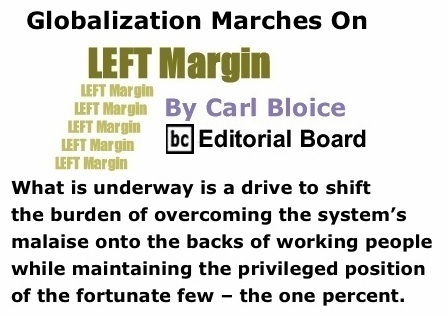




Earlier
this year, when the young boss of Fiat appeared in Turin to mark the
Tenth Anniversary of the death of the automaker’s founder, Gianni
Agnelli, he noted the company’s roots in the northern Italian city.
Afterwards, a journalist stood up and said, “You want us to be happy
about Fiat now being an international company. Fine, we are. But what
about the people in Termini Imerese? They no longer have jobs.”
The exchange was reported by Rachel Sanderson in the Financial Times,
May 31 as a lead into a story about how Fiat is considering “moving its
main corporate headquarters to the US from Turin after a merger with
Chrysler that is expected later this year.” The “roots” comment, by
37-year-old Fiat Chair, John Elkann, Sanderson wrote, “have been
remembered with some bitterness in Italy in the last few days as Fiat
and its sister company Fiat Industrial crank up what appears to be the
final stages of a push to become US-listed multinationals.”
The journalist was referring to the auto plant in Sicily that closed
two years ago after it was sold to a Chinese firm that, in cooperation
with an Israeli firm, is reportedly planning to put it back in
operation sometimes next year.
“Like the takeover of UK chocolate maker Cadbury by Kraft of the US,
Fiat’s withdrawal from money-losing Italy as it becomes part of a
global group has created a national sense of loss at a time when the
country is struggling with a deep two-year-old recession and
unemployment at a near-20 year high.” wrote Sanderson.
Fiat CEO Sergio Marchionne told the paper he
“is looking at primary listings for the two groups in New York to gain
better access to capital markets.”
Max Warburton, a global autos analyst, told Sanderson that Marchionne’s
relocation plan is “genius.” “This guy is saying, it is my job to run a
profitable business,” he said. “I’m a capital allocator and I’m not
willing to sit here in Italy and burn cash into (sic) perpetuity.
Leaving aside the national politics, no investors are going to complain
about that, nor is the [Agnelli] family, nor should Fiat engineers and
staff who will be part of a bigger and more secure business,” Mr.
Warburton says.
“Other analysts argue that Fiat has not gone far enough and should be
closing more of its under productive factories in Italy and focusing on
its 100 per cent productive plants in Brazil or Eastern Europe,” wrote
Sanderson.
Where, of course, wages are lower and benefits fewer.
The closure of the Sicilian auto plant and the corporate departure for
New York underscore an essential truth about the economic and political
situation in Europe today. Although most of commentary in the major
mass media paints a picture of mismanaged and profligate countries in
the southern part of the continent unwilling to carryout “reforms”
necessary to overcome the effects of capitalism’s contemporary crisis,
the reality is something else indeed. What is underway is a drive to
shift the burden of overcoming the system’s malaise onto the backs of
working people while maintaining the privileged position of the
fortunate few – the one percent.
Last week, the front page of the New York Times revealed that that there is such a thing as a “ruling class” in Turkey.
Well, there are ruling classes in Common Market countries as well. And
just as the proponents of austerity in the U.S. and Britain insist that
working people and the poor make the sacrifices to overcome the havoc
created by the profit hungry banks and other centers of high finance,
there will be no pay cuts, reduced benefits or cutbacks in retirement
security for the ruling classes of Europe.
For a glimpse at the lifestyle of those on the upside of globalization,
consider this. In September 2004, on the Island in the middle of
Italy’s second largest lake, Fiat’s John Elkann married the Italian
countess, Donna Lavinia Borromeo. The ceremony was followed by a
reception that featured a 5 meter long chocolate cake depicting the
Lingotto auto plant in Turin and a unicorn, the heraldic symbol of the
Borromeo family, which owns the lake. According to press reports the
guest list including Henry Kissinger, Former U.S. Secretary of State
and National Security to former President Richard Nixon; Michel
Platini, president of the Union of European Football Associations;
fashion superstar Valentino Garanani, wealthy Australian model Elle
Macpherson, and “technocrat” Mario Monti, Italian Prime Minister from
2011 until a couple of months ago.
These are a few of the people who move their money around the globe in
a never ending search for greater profit, who close plants in one
country and move to lower wage areas abroad, who try to weaken or smash
labor unions wherever they can, and have their hands in the pockets of
politicians across the planet.
Last month, thousands of people protested in
Rome against austerity policies and high unemployment, urging new Prime
Minister Enrico Letta to focus on creating jobs to help pull the
country out of recession.“We hope that this government will finally
start listening to us because we are losing our patience,” stated Enzo
Bernardis, who joined the sea of protesters waving red flags and
calling for more workers' rights and better contracts.
Italy is in a recession and unemployment has skyrocketed with youth
unemployment at around 38 percent. “We can’t wait anymore” and “We need
money to live” were among slogans on banners held up by the crowds.
Labor leaders told the media that Letta needed to shift away from the
austerity agenda pursued by former prime minister Monti, who Reuters
reported “introduced a range of spending cuts, tax hikes and pension
reform to shore up strained public finances.”
“We need to start over with more investment. If we don’t restart with
public and private investments, there will no new jobs,” said Maurizio
Landini, secretary-general of the left-wing metalworkers union Fiom.
“This government will last a very short time,” said demonstrator Marco
Silvani. “What we need is a new leftist party that fights for the
rights of the people.”

BlackCommentator.com Editorial Board member and Columnist Carl
Bloice is a writer in





